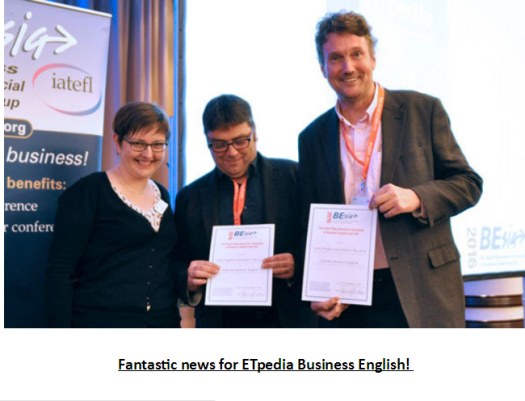Letter 1

Letter 2

We're delighted to announce that not just one but 3 of our books have been shortlisted for an ESU English Language Award in the Resources for Teachers category.
This prestigious award celebrates innovation and good practice in English language teaching. This year the judges were looking in particular for materials that focussed on oracy skills.
The Delta Publishing titles that have been shortlisted are:
Film in Action by Kieran Donaghy - a practical guide to using film in the classroom
www.deltapublishing.co.uk/titles/methodology/film-in-action
Speaking Games by Jason Anderson - photocopiable activities to make language learning fun
www.deltapublishing.co.uk/titles/photocopiables/speaking-games
Teaching children how to learn by Gail Ellis and Nayr Ibrahim - a major resource offering teachers a practical new methodology
www.deltapublishing.co.uk/titles/young-learners/teaching-children-how-to-learn
Letter 3

www.aceducation.ca/
Activities, Handouts and Lesson Plans
Humour is a good way to bring some energy into your class. ESL Jokes has a wide assortment of lessons and activities that you can use to do this.
A Story Maze is a new way of teaching your students language skills that has been tested by Elizabeth Enkin at University of Nebraska-Lincoln. Story Mazes are intended to get your students thinking quickly about the logical progression of words. In a Story Maze, you give your students the beginning of a story and then a choice of words (3 to 4) to help them complete the next part of the story. Students then repeat these steps until the story is complete. Try this with students working individually or as a fast paced full class activity.
Writing complex and comprehensive responses to a piece of writing or a movie is an important skill for high level students. Susanne Rubenstein has written a lesson plan for Read Write Think to help teach your high level students how to read and write reviews.
Websites, Videos, and Articles
The American election is in the global spotlight. As we move closer to the day of the election, discussion is heating up. BBC Learning English has released a video review of the recent debate between the American presidential candidates analyzing the language used. Check out the Trump versus Clinton video review here as well as the exercises that go with it!
In a recent blog post on the TESOL International website, Tara Arntsen evaluates a new tool available to students called Grammarly. Grammarly is an easily accessible online grammar checker. In her post, Tara identifies what students can gain from using the tool along with some challenges that it might present for learners of English as a second language.
The idea of personalized learning is something that many teachers strive for but the reality of our teaching situations means that we can't fully embrace the concept as much as we would like to. Nichole Dobo at The Hechinger Report recently looked at the idea of personalized learning and how we as teachers might be able to achieve this goal in our specific contexts.
Professional Development Webinars and Conferences
In November, the Macmillan English Campus will be hosting an online conference that is free for all who are interested to attend. The conference will run for five days and features webinars on many trending teaching topics. For more information about the event, visit their website!
If you work with English language students who also have dyslexia, sign up for Scientific Learning's webinar on 2016 Dyslexia Research and Remediation.
It's conference season for many TESL organizations in Canada.
- Alberta TESL will be holding ATESL 2016 - Inspiring through Inclusion and Communication in Edmonton on October 14th and 15th. ACE will be exhibiting and presenting in Edmonton so make sure you stop by to say "Hi"!
- TEAL Manitoba will be holding their fall professional development event on October 21st in Winnipeg.
- TESL Novia Scotia will be hosting their annual conference on November 5th at Dalhousie University in Halifax.
- And finally, on November 24th and 25th, TESL Ontario will be holding their annual conference at the Sheraton Center in Toronto.
The Language Program Management Corner
Temperature Check Your Language Program
No, the title does not refer to using a thermometer to make sure that your students are not sick. It refers to finding out how your students feel about their language program experience while they are in the middle of the program. Don't wait until your end-of-course or end-of-term surveys to find out what students are thinking. By then it is too late to change their student experiences.
To temperature check your entire school, randomly select a day and time for a school wide survey. Have all students complete the same paper-based survey at the same time. Keep the survey to between four and six questions in length. Each time you do the survey, focus on a different aspect of your school. One term you can survey students about the extracurricular activities. The next term survey them about their classroom experiences.
Here is an example of a classroom experience survey that works well to temperature check your language program. It is short, simple and to the point. And it will let you clearly know how you are doing in meeting student needs. Randomly temperature checking your language program will allow you to proactively head off issues before they arise. And it will allow you to provide your students with the best possible learning experience!
Adapted from: www.edutopia.org
The ACE PD Exchange Video of the Month
This month's new video is: ESL Student & Teacher Interviews: Canadian Culture.
As English language teachers, we don't just teach the English language, we also teach the culture that goes along with the English language. In this video, you'll see a series of interviews with both ESL students and ESL teachers on the topic of Canadian culture. The ESL students share with us some of their first impressions of Canadian culture, as well as some of the things they found interesting, challenging and unique about Canadian culture. The ESL teachers discuss how they teach Canadian culture in their classes and some of the most important aspects of Canadian culture that they focus on with their students. They share their opinions on the biggest misconceptions students have about Canadian culture and finally, impart advice for new teachers on how to help their students be successful in a Canadian cultural context.
Check out a sneak peek of the video below or click here to access the full video and accompanying handout if you're already a member of the ACE Professional Development Exchange.
If you're not a member yet, click here to sign up or learn more about the features of the site here.
Letter 4
Hello Hania
As a teacher and as a YouTube addict, there is a certain viral video that I have always been fascinated with. It's the most popular animal video on YouTube and it has just turned 10 years old. I'm sure you know it – it's the 'Sneezing Baby Panda'.
Click here to see the first part of my new series
I have been observing, exploring and working with this video for a decade now. And to mark the anniversary, I have decided to launch a short series on YouTube in which I tell the story of the viral video through an educator's eyes.
If you are interested in following, please subscribe to my YouTube channel click here.
Also there's a new video activity on Lessonstream that I think you'll like. It focuses on a type of compound noun that I like to call "Thing Do-ers" (bottle openers, pizza cutters, guitar players, anteaters, grave robbers, trendsetters, tax dodgers and troublemakers).
Click here to access the video and PDF on Lessonstream
Feel free to share, copy, forward, quote, or anything else.
Have a great end of week / weekend
Jamie Keddie :)
Letter 5
Dear Hania Kryszewska,
We are delighted to feature two more of our authors from our extensive international network in our ‘Meet our Authors’ series this month.
This month’s authors…
Robert Ignatius Letellier is a member of Trinity College, Cambridge and the Meyerbeer Institute Schloss Thurnau, among other institutions. He has over 100 publications to his name, including books and articles on the late-seventeenth-, eighteenth- and early nineteenth-century novel, the Bible, and European culture, the majority of which have been published by Cambridge Scholars. Please click here to read his thoughts.
David Mathew works at the University of Bedfordshire, UK, and as an independent researcher and occasional journalist. His research interests often circle around psychoanalysis, pathologies, education and systems of control. Please click here to read his thoughts.
With an ever-expanding number of language-related titles in our catalogue, we are delighted to support the European Day of Languages, which takes place annually on 26th September. This initiative’s aims include alerting the public to the importance of language learning, diversifying the range of languages learnt and promoting the rich linguistic and cultural diversity of Europe.
We are also pleased to highlight another noteworthy review of one of our titles this month: to read Dr Mark Hampton’s review of Sun & Sea Tourism: Fantasy and Finance of the All-Inclusive Industryand to find out more about how to get your book reviewed, click here.
Book of the Month – this month’s must-read is Religious Faith and Teacher Knowledge in English Language Teaching, which demonstrates that personal faith and professional identities and practices can, and do, interact and interrelate in ways that are both meaningful and problematic. Described as “groundbreaking work” by one reviewer.
Forthcoming Titles, New Releases and Best Sellers – be the first to know about our new and noteworthy, or best-selling titles—all reduced by up to 50%. Our Editors have hand-picked 9 titles that are generating a buzz. Please click on our homepage to view the selection.
Happy reading!
Christine
Christine von Gall
Deputy Editor
Cambridge Scholars Publishing
christine.von-gall@cambridgescholars.com
Letter 6

Letter 7
Lexicon of Killings and Nonkillings
NKARC colleague Professor Emeritus Francisco Gomes de Matos has been a regular contributor to this letter through his Nonkilling rhymed reflections. He is a linguist innovator. Reacting to recent killings of innocents in Brussels and Paris, he sent the following insightful piece on Killing and Nonkilling lexicon - the words ending with -cide, we need to create their antonyms in thoughts, words and actions.
Against all types of KILLING. A Checklist on words in -CIDE
One of the most painful, shocking things to hear these days : "In today`s world, killings there will always be". Notwithstanding that bluntly realistic statement, as co-responsible global citizens, we should nurture/sustain our commitment to compassion, dignity, empathy, equality (especially economiquality), harmony, mutual understanding, and peace and in all of our languages wholeheartedly assert: "One day, one day, all of the following types of killing will disappear from the Earth:
Checklist on -CIDE words :
1 - animalcide
2- apicide
3- arboricide
4 - ecocide
5- ethnocide
6 fraticide
7- genocide
8- herbicide
9- homicide
10- infanticide
11- innocenticide
12- linguicide
13-matricide
14-patricide
15- suicide
Please add to the list, discuss it, translate it into other languages. Help prevent the list from expanding globally.
One day, one day, in a not-too-distant future, -CIDE words will be remembered as acts of killing humankind engaged in or was subjected to. Such destructive past will become a
LIFE-dignifying-enhancing present.
May each of us humbly contribute to making that humanity-transformation come true.
xxx
Words keep us company, even when we are asleep
In our day/night dreams we navigate in cognitive seas that are either shallow or deep
Words accompany us all the time
Whether we use ordinary prose or aim to rhyme
Words accompany us monolingually
and keep us company multilingually,too
words help or hinder interactions between me and you
When words are used constructively, they may bring us peace
If all of Humankind learned to avoid words and acts of war
PEACE would inhabit the Earth as never before !
When poetry deeply matters,
by Francisco Gomes de Matos, a peace-nonkilling linguist, Recife,Brazil
POETRY deeply matters when it is focused on PEACE
POETRY deeply matters when poets sing :all kinds of violence should cease !
POETRY deeply matters when poets use their art
to dignify the human mind and the human heart
POETRY deeply matters when poets all types of killing denounce
POETRY deeply matters when poets a Nonkilling World they announce
POETRY deeply matters when poets PEACE+NONVIOLENCE+NONKILLING creatively interconnect and integrate
POETRY deeply matters when poets compose poems that a "love-one-another global citizenship" wisely celebrate
xxx
The value of time
We may say we value time
but do we make it sublime ?
How ? By
elevating dignity ?
enhancing morality ?
ensuring equality ?
building serenity ?
respecting spirituality ?
showing humility ?
sustaining humanity ?
Deeply to value time,
let`s make it sublime !



|